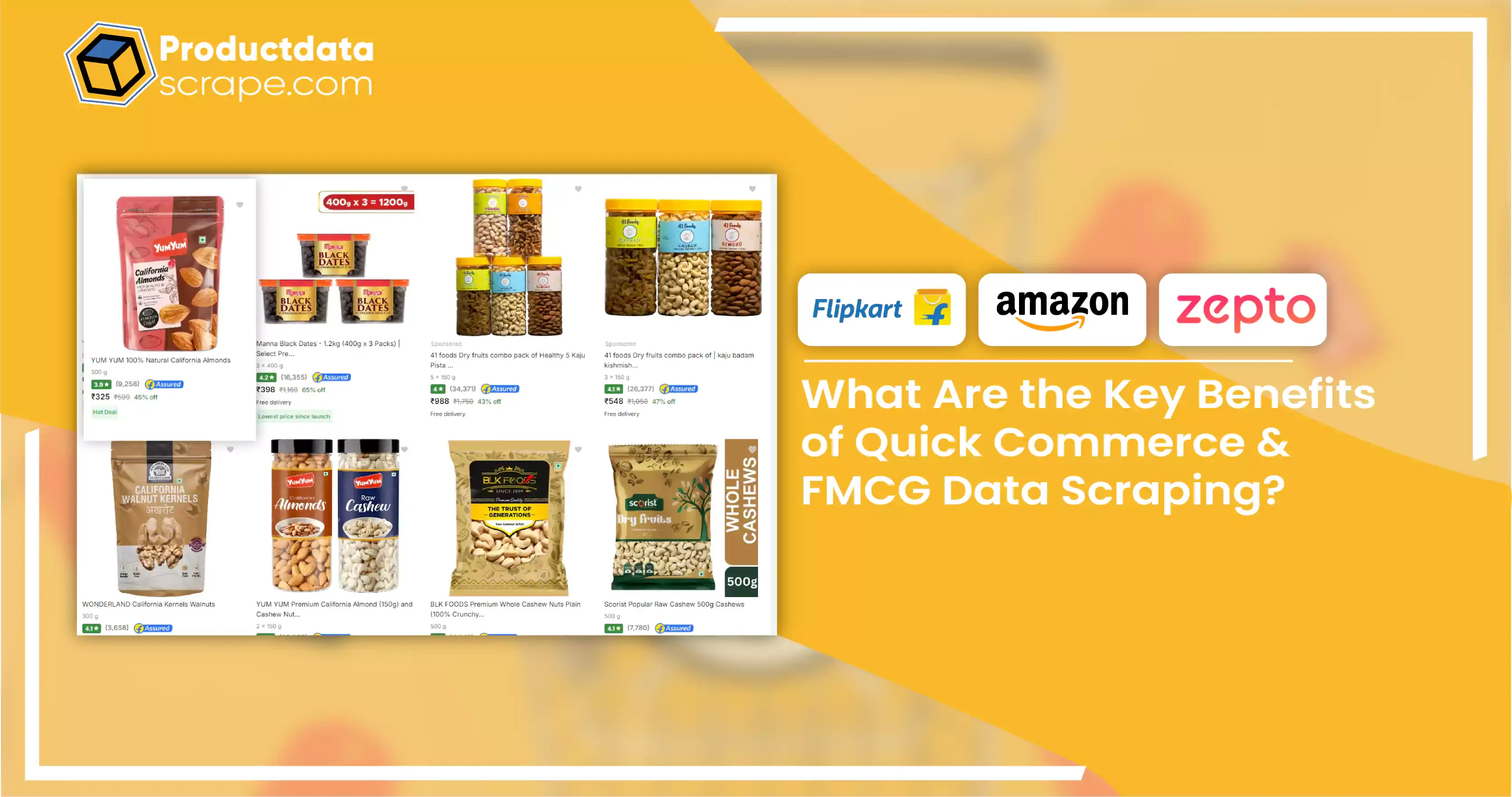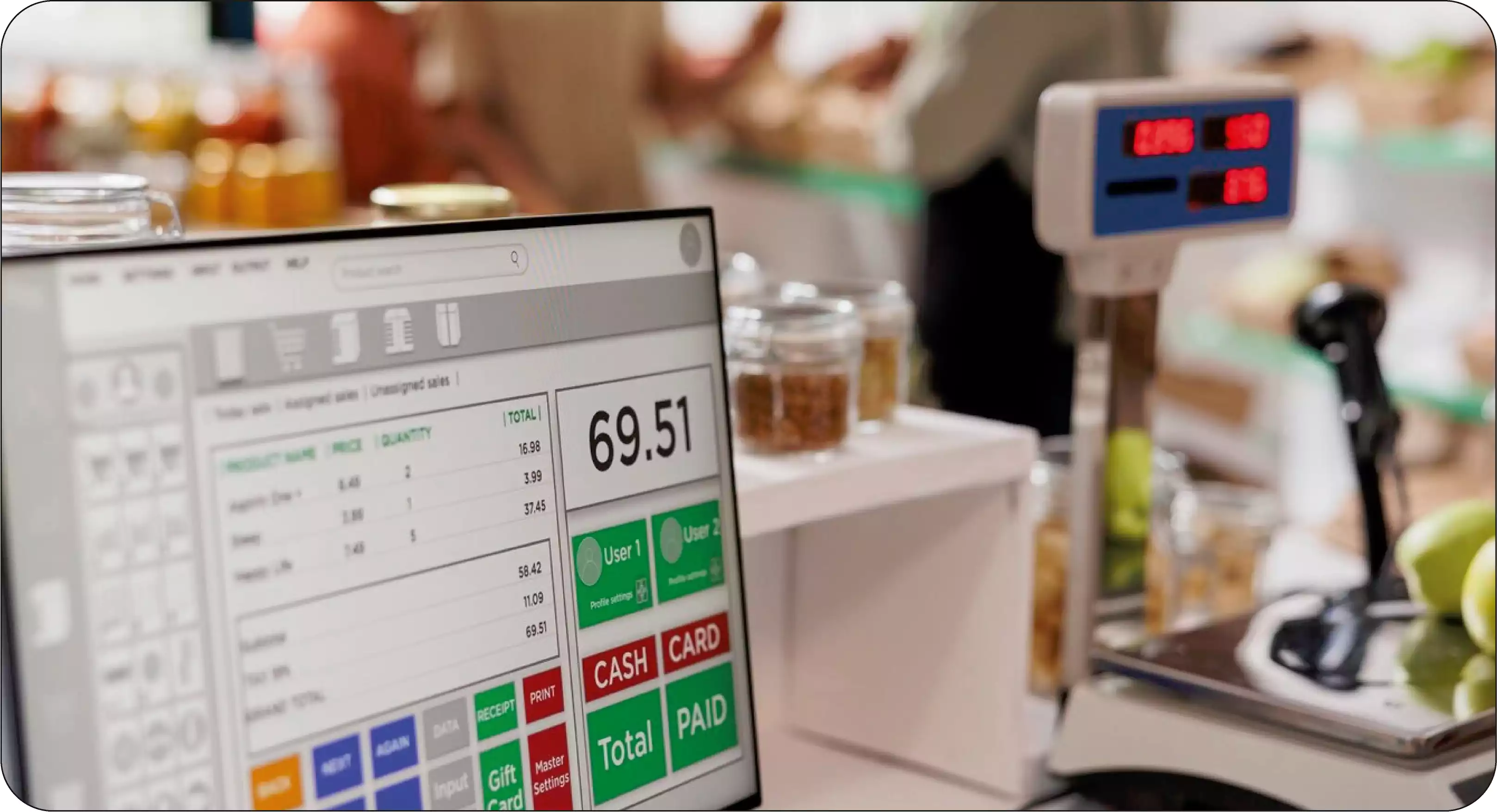
Quick Commerce (QC) has revolutionized retail by offering ultra-fast delivery of consumer goods, transforming how Fast-Moving Consumer Goods (FMCG) are distributed and consumed. This rapid delivery model of grocery items requires real-time insights into market trends, pricing dynamics, and consumer preferences, making data scraping indispensable.
FMCG product data scraping involves collecting critical information from e-commerce platforms, retailers, and marketplaces. This data includes product availability, pricing variations, customer reviews, and promotional strategies. By leveraging Quick Commerce and FMCG data scraping techniques, businesses gain competitive advantages, such as optimizing pricing strategies, forecasting demand accurately, and enhancing inventory management.
However, ethical and legal considerations are paramount in Quick commerce grocery data scraping. Adhering to website terms of service, respecting robots.txt directives, and obtaining consent for data use are essential to avoid legal repercussions and maintain ethical standards.
Adequate FMCG data scraping solutions require robust technical infrastructure, including scalable tools, proxy management, and data validation processes. Monitoring and adapting to website changes ensure data accuracy and relevance, empowering businesses to make informed decisions swiftly in the dynamic QC environment.
Significance of Quick Commerce & FMCG Data Scraping
Quick Commerce (QC) and FMCG data scraping provide real-time market insights, optimize pricing and inventory management, enhance competitive analysis, ensure regulatory compliance, and empower strategic decision-making for operational efficiency and growth.
- Real-time Market Insights: FMCG market research gives businesses real-time information on consumer preferences, market trends, and competitor activities. This enables quick adjustments to marketing strategies and product offerings.
- Optimized Pricing Strategies: By scraping grocery data from various e-commerce platforms and retailers, businesses can analyze pricing dynamics, monitor competitor pricing strategies, and adjust their prices dynamically to stay competitive.
- Enhanced Inventory Management: Automated FMCG data extraction allows businesses to accurately track product availability, stock levels, and demand patterns across different channels. This helps optimize inventory levels and reduce stockouts or overstock situations.
- Competitive Analysis: Grocery data scraping facilitates detailed competitive analysis by gathering information on competitor products, pricing, promotions, and customer reviews. This insight enables businesses to differentiate themselves and identify opportunities for improvement.
- Improved Customer Experience: Access to data on customer preferences and buying behavior helps in offering personalized recommendations, improving customer service, and enhancing overall shopping experiences.
- Regulatory Compliance: Adhering to legal and ethical standards in Quick Commerce data mining ensures compliance with data privacy regulations (e.g., GDPR, CCPA) and website terms of service. This mitigates legal risks and maintains trust with customers and stakeholders.
- Operational Efficiency: Scraped data supports efficient supply chain management by optimizing procurement, logistics, and distribution processes based on real-time market demands and inventory insights.
- Strategic Decision-making: The insights gained from Quick commerce inventory scraping empower decision-makers to make informed strategic decisions, such as market expansion, product launches, and investment prioritization, thereby driving business growth and profitability.
Role of FMCG Web Scraping Services
FMCG web scraping services provide vital insights into market dynamics, competitive strategies, and consumer behavior, empowering businesses to optimize pricing, inventory, and operational efficiency for sustained growth and competitiveness.
Real-time Market Monitoring: They continuously gather and analyze data from various e-commerce platforms, retailers, and marketplaces. This gives businesses timely insights into market dynamics, including pricing trends, product availability, and consumer preferences. Such insights enable businesses to make informed decisions swiftly, adapting their strategies to market conditions.
Competitive Intelligence: These services track competitors' activities comprehensively. They monitor competitors' pricing strategies, promotional campaigns, product launches, and market positioning. By understanding how competitors operate in real time, businesses can adjust their strategies to maintain competitiveness and seize opportunities.
Inventory Optimization: By FMCG competitor analysis on stock levels, FMCG web scraping services help businesses optimize inventory management. They accurately forecast demand patterns and product popularity, minimizing stockouts and reducing excess inventory. This ensures that businesses can meet customer demand efficiently while controlling costs.
Price Monitoring: Monitoring price fluctuations across different platforms allows businesses to implement dynamic pricing strategies. Web scraping for FMCG analytics collects pricing data from multiple sources, enabling businesses to adjust prices in response to changes in market conditions and competitor actions.
Brand Reputation Management: Scraping grocery data includes monitoring customer reviews and sentiments about products and brands. This helps businesses gauge consumer satisfaction, identify potential issues early, and take proactive measures to enhance brand reputation and customer loyalty.
Market Expansion: These services identify new market opportunities by analyzing consumer preferences and emerging trends. By scraping data from diverse geographical regions and demographic segments, businesses can uncover untapped markets and tailor their offerings to effectively meet local demand.
Operational Efficiency: Scraping FMCG product information improves efficiency by optimizing procurement and logistics processes. Accurate demand forecasting based on scraped data allows businesses to streamline supply chain operations, minimize wastage, and improve overall distribution efficiency.
Regulatory Compliance: Ensuring compliance with data privacy laws (such as GDPR and CCPA) and website terms of service is crucial. FMCG web scraping services adhere to legal requirements, obtain data ethically, and respect consumers' privacy rights. This mitigates legal risks and maintains trust with stakeholders.
Scraping FMCG prices is pivotal in providing actionable insights, enhancing competitiveness, and driving strategic decision-making in the fast-paced consumer goods industry.
How does fast-moving consumer goods data extraction help monitor the quick commerce market?

Fast-moving consumer goods data extraction is crucial in monitoring the Quick Commerce (QC) market by providing real-time insights and enabling agile decision-making. QC, characterized by ultra-fast delivery of consumer goods, relies heavily on accurate and timely data to effectively meet customer demands.
Firstly, FMCG data extraction facilitates continuous monitoring of market trends, consumer preferences, and competitor activities. By scraping data from e-commerce platforms, retailers, and marketplaces, businesses can track product availability, pricing fluctuations, and promotional strategies in real time. This allows them to adjust pricing strategies dynamically and capitalize on market opportunities swiftly.
Secondly, quick commerce market analysis supports inventory management in the QC market. Businesses can accurately forecast demand patterns and monitor stock levels across multiple channels. This helps prevent stockouts, minimize excess inventory, and optimize supply chain efficiency. With precise inventory insights, QC providers can ensure timely order fulfillment and maintain high service levels.
Moreover, it aids in competitive analysis by gathering data on competitors' pricing, product assortments, and customer reviews. This enables businesses to benchmark their performance, identify competitive threats, and refine their market positioning strategies accordingly.
Ultimately, leveraging Quick commerce price monitoring empowers businesses to enhance operational agility, improve customer satisfaction, and sustain competitive advantage in the rapidly evolving landscape of quick commerce. By harnessing data-driven insights, QC providers can navigate challenges effectively and drive growth in this dynamic sector.
Conclusion: Quick Commerce (QC) and FMCG data scraping are pivotal in transforming businesses' operations in the fast-moving consumer goods sector. By providing real-time market insights, optimizing pricing strategies, and enhancing inventory management, these techniques enable businesses to stay competitive and agile in a rapidly evolving market. Adhering to ethical and legal standards ensures trust and compliance, mitigating risks while maximizing growth opportunities. With the ability to monitor competitor activities, adapt to market dynamics swiftly, and improve operational efficiency, QC and FMCG data scraping are indispensable tools for businesses aiming to thrive in the dynamic landscape of quick commerce.
At Product Data Scrape, ethical principles are central to our operations. Whether it's Competitor Price Monitoring Services or Mobile App Data Scraping, transparency and integrity define our approach. With offices spanning multiple locations, we offer customized solutions, striving to surpass client expectations and foster success in data analytics.































.webp)






